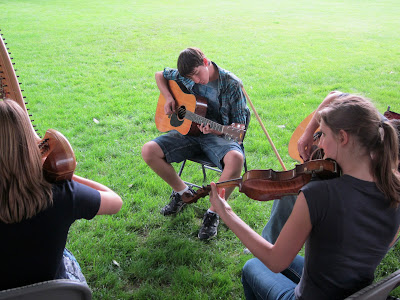I'm reading through the 28 fundamental beliefs of the Seventh-day Adventist church and came upon the 15th: The Lord's Supper.
Being a 5th generation Adventist, I'm quite familiar with the once-a-quarter communion service. So familiar, that I sometimes feel like I'm just going through the motions.
But not anymore.
Read this story that I came across:
A Buddhist monk once asked a missionary to suggest a scene that would represent Christianity. Artists were to decorate a hall on the monastery grounds with murals and reliefs that depicted major world religions. After some reflection the missionary began to share the account in John 13. The monk "said nothing as I read," the missionary recounted, "but I felt a strange, awesome quietness and power as the passage described Jesus' act of washing the disciples' feet." In that culture, discussing in public anything having to do with matters of the feet is considered very poor etiquette.
"When I finished reading, there was a moment of silence. He looked at me with incredulity and said, 'Do you mean to say that the Founder of your religion washed His students' feet?'
"'Yes,' I replied. The usually placid moon face with shaved eyebrows and head wrinkled up in shock and amazement. He was speechless, and so was I. I swallowed very hard several times, and we were both caught up in the drama of the scene. As I gazed at him, the look of incredulity on his face changed to a reverent awe. Jesus, the Founder of Christianity, had touched and washed dirty fishermen's feet! After a few moments he gained control of himself and rose to his feet. 'I see now the essence of Christianity.'"
Do you see it?
Being a 5th generation Adventist, I'm quite familiar with the once-a-quarter communion service. So familiar, that I sometimes feel like I'm just going through the motions.
But not anymore.
Read this story that I came across:
A Buddhist monk once asked a missionary to suggest a scene that would represent Christianity. Artists were to decorate a hall on the monastery grounds with murals and reliefs that depicted major world religions. After some reflection the missionary began to share the account in John 13. The monk "said nothing as I read," the missionary recounted, "but I felt a strange, awesome quietness and power as the passage described Jesus' act of washing the disciples' feet." In that culture, discussing in public anything having to do with matters of the feet is considered very poor etiquette.
"When I finished reading, there was a moment of silence. He looked at me with incredulity and said, 'Do you mean to say that the Founder of your religion washed His students' feet?'
"'Yes,' I replied. The usually placid moon face with shaved eyebrows and head wrinkled up in shock and amazement. He was speechless, and so was I. I swallowed very hard several times, and we were both caught up in the drama of the scene. As I gazed at him, the look of incredulity on his face changed to a reverent awe. Jesus, the Founder of Christianity, had touched and washed dirty fishermen's feet! After a few moments he gained control of himself and rose to his feet. 'I see now the essence of Christianity.'"
Do you see it?






